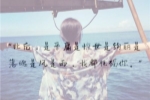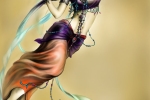
英语作文经典名句【一】
Every girl dreams and Li Xie is no exception. She has read dozens of books on how to be a ballerina and Swam.
每一个女孩都有梦想,李协也不例外。她读了很多书,都是关于如何成为一个芭蕾舞演员的
Lake is her favorite. She hopes one day her dream will come true. She has taken ballet lessons and all her teachers confirm she is a good student.
她最喜欢的是天鹅湖。她希望有一天能梦想成真。她参加了芭蕾舞培训班,所有老师都认为她很优秀。
One day she saw an advertisement that a famous ballerina troupe will be performing in her hometown.
一天,有一则广告说一个著名的芭蕾舞团要在她的家乡演出
Her thoughts ran wild, "I must meet up with the leader of the troupe and show him my skills, " she murmured to herself.
她看到后顿时思绪纷杂,自言自语道:¨我必须要见见团长,展示一下我的`才艺。¨
She dressed herself in her ballerina costume and managed to evade the guards and hid in the dressing room.
她穿上芭蕾服,尽量避开门卫躲进了化妆室。
To her luck the leader entered and she timidly knocked at the door.
很幸运,团长进来了,她胆怯地敲了敲门。
She bravely approached him and handed him a bunch of red roses and in her excitement the thorns pricked her hand but she did not make much ado about the pain.
她鼓足勇气走近他,送上一束红玫瑰。激动之余,玫瑰的刺戳到了她的手,但她根本没有在意。
The leader observed her action as she told him her dream. "Alright, you dance and I will give you my verdict."
在她给团才讲自己的梦想时,团长注意到了她的举止。“好吧,你先跳,我再说我的意见。"
But half way through the dance he stopped her and said, "I'm sorry you're not good enough!"
但是她只跳了一半,团长就让她停下来,说道: ¨我很抱歉你跳得还不。
On hearing this Li Xie ran as fast as her legs could carry her and was ashamed. She gave up her dream.
听到这话,李协非常羞愧,拼命地跑开了。从此,她放弃了梦想。
Many years later, she heard that the same ballet troupe was performing in her town again.
多年以后,她听说原来那个芭蕾舞团又一次来到她家乡演出。
Bitter memories of the leader's harsh words came flooding back to her.
团长尖刻的话语涌上心头,这是一次痛苦的记忆。
This time she was determined to find out Why the leader had told her she was not good enough when all her teachers thought otherwise.
这次她决定向团长问个究竟,为什么别的老师都认为她跳得很好,而他却不这样认为。
This was his reply, "I tell this to every student." She angrily shot back, "You've ruined my life!一 Then she got a further shock, "
团长回答道:u我对每个学生都这样说。¨她生气地反驳说:“可是你毁了我的一生!”团长的回话让她更震惊了:
I remember your gift of roses and how the thorns had pricked your fingers but you carried on bravery.
“我记得你送的玫瑰,刺戤到了你的手指,而你却勇敢地继续表演。
If you only had treated bal}et like that and did not give up so easily; therefore, you still deserve my verdict! "
如果你能以那种精神对待芭蕾舞,就不会轻易放弃了。因此,我的意见对你仍然受用。
英语作文经典名句【二】
,还原情境还英语作文经典名句【三】
The Wolf and the Lamba
Wolf, meeting with a Lamb astray from the fold, resolved not to lay violent hands on him, but to find some plea, which should justify to the Lamb himself his right to eat him. He thus addressed him:"Sirrah, last year you grossly insulted me." "Indeed," bleated the Lamb in a mournful tone of voice, "I was not then born." Then said the Wolf, "You feed in my pasture."
"No, good sir," replied the Lamb, "I have not yet tasted grass." Again said the Wolf, "You drink of my well." "No," exclaimed the Lamb, "I never yet drank water, for as yet my mother′s milk is both food and drink to me." On which the Wolf seized him, and ate him up, saying, "Well! I won′t remain supperless, even though you refute every one of my imputations."The tyrant will always find a pretext for his tyranny.
一只狼瞧见一只迷路失群的小羊,决定暂缓下毒手,想先找一些理由,对小羊证明自己有吃它的权利。它就说:「小鬼!你去年曾经骂过我。」小羊可怜地说:「老实说,我去年还没有出生呢。」狼再说:「你在我的草地上吃过草。」
小羊回答说:「不,好先生,我还未曾尝过草的味道呢。」狼又说:「你喝过我井里的水。」小羊叫道:「不,我从没有喝过水,因为直到今天为止,我都是吃着母亲的奶汁。」狼一听这话,便抓住它,把它吃下去,便说:「
英语作文经典名句【四】
答题分析:
1.还原情境
“杨柳岸,晓风残月”一共才七个字,乍一看,给人无从下手的感觉。其实,要求扩写的诗词名句一般都出自同学们非常熟悉的课本,题目本身已经给了同学们解题的隐性已知条件——诗句的情境因素。
做题时首先应该还原诗句的情境,通过回忆全诗或全词弄清该情境包含的三项内容:时间、地点、人物,然后就可以确定解题的切入点,根据自身的爱好和特长扩写了。
此外,还原情境还可以避免张冠李戴、自相矛盾的错误出现。比如,有的同学把“杨柳岸”扩写得春光旖旎、春意盎然,如果在还原情境时,想到词中写的是深秋清晨的景物,就能避免这样的\'失误了。
本题在还原情境后可得出如下结果:时间——深秋清晨;地点——某个泊船的渡口;人物——离别情人的“愁人”。
2.构设画境
古诗词中的很多名句,如“明月松间照,清泉石上流”“日暮苍山远,天寒白屋贫”等都具有强烈的画面感。“杨柳岸,晓风残月”虽仅七字,但七字中包含一近一远两个画面,极有层次,且符合情理。作者由近及远,先描摹岸边“杨柳”,后绘写天际“残月”,完全符合人视物的顺序及习惯。
扩写时,应充分尊重作者的构设,将画面一个个有序展开,突出景物描写的顺序感、方位感、画面感。依据作者思路来布设写景的顺序和画面,不仅可以减少答题构思的时间,而且能使答题更准确更到位。
3. 表现意境
古诗词非常强调意境。要使有意境,就要在诗中的景物描写中融入或明或暗、或隐或显的感情。而扩写题往往都有“不得改变原诗(词)意境”的要求,因而首先要原诗所蕴涵的感情,然后将这种感情融入扩写中。原诗感情为悲;扩写文字感情即定调为悲;原诗感情为喜,扩写即定调为喜,二者绝对不能冲突、矛盾。
对例题,同学们应该细心体会“残”字所蕴涵的丰富情感,挖掘出作者借此表达的情愫,并在扩写中表现出来。
参考答案: 秋日清晨的寒意,唤醒了因畅饮离情而酩酊的词人。渡口已不是昨日的渡口,情人的身影也早已不见。杨柳依旧是昨日的杨柳,只是少了被柳枝牵萦的裙裾。飘零的衰黄柳叶,带着如泪的清露,沾上词人的衣襟,也沾上词人的心魂。晓风微起,似纤纤玉手分开密密的柳烟,一弓残月映入词人的眼帘。那是离人苍白的面容和孤寂的眼?
最后,我认为同学们应该在复习时熟读乃至背诵教材中的诗词,并试着翻译诗词中的经典写景名句,以增强文言、现代语言之间的转换能力,从而提高自己扩写古诗词名句的能力。

















